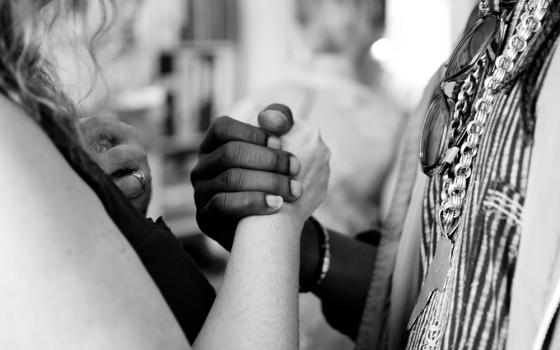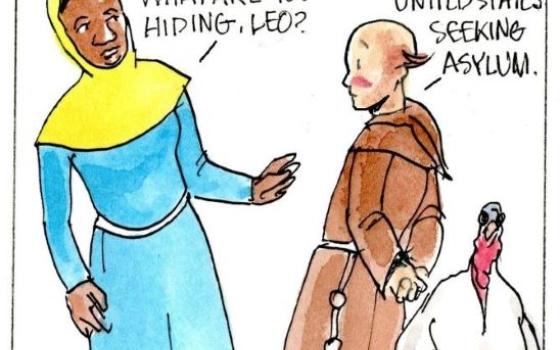Last week, we buried my father. In the time from his death until his burial, I was acutely aware of what a priest friend said to me a long time ago: "The church is her best at a funeral." It is so true.
In the face of death, the world has nothing left to say. Those who attempted it, and I encountered several very well-meaning people who tried to give voice to the deep sentiments my father's death occasioned, ended up sounding sentimental or even trite. Funerals are no time for the power of positive thinking. The only words that help at such a moment are liturgical words, precisely because they touch a chord that already exists, because they are known words. And that got me to thinking: What do the "nones" do at such a time?
It is cruel to expect people who are mourning a very recent loss to have to come up with the words of a service. And unless it is a family of poets, the words will be inadequate. If there is any kind of service involving many people, what common points of reference exist that will bind the assembly together? What themes can be carried from a eulogy into a song or into a prayer, or vice versa? How would one start to plan such a service?
I have always thought that the best part about a Catholic funeral Mass is that it is pretty much exactly like any other Mass. We know when to stand and when to kneel. We know the prayers. We know there is a rhythm to the liturgy. The Mass takes grief and directs it. It doesn't deny it. It doesn't minimize it or drown it in euphemisms. The Mass of Christian Burial directs our grief towards our ritually re-stated belief about the death and resurrection of Jesus Christ, which alone corresponds to the sense of loss. It is impossible to "make sense" of suffering, just as it is impossible to make sense of love, because suffering is nothing more or less than the face of love amidst sin. That is why we believe the crucifix is the very image of God's love. If you could explain love, the way you can explain crop rotation or the mechanics of an automobile, it wouldn't be love, would it? The same holds for suffering and death. The church does not explain it, she demonstrates its soteriological significance.
I was so grateful for the assistance of trained clergy. It is not only that they avoid sentimentality and banality. It is that they know what needs to be done and they do it. I was so blessed to have the help of two new curates from a large nearby parish assist the liturgy as masters of ceremonies. You always forget something: This time it was the general intercessions. I did not write any. I did not select someone to read them. But just as I was realizing this oversight, one of the curates came out from the sacristy with a book containing the funeral rites that includes general intercessions, and he handed the book to one of the priests who had no other assigned task at the Mass. "They are pros," I thought to myself. Our church has a tiny sanctuary, and there were eight priests in addition to the archbishop, so it was helpful having two of the priests directing traffic. When things get messed up, it is a distraction no one needs.
Our Scriptures are, like the liturgy itself, a means of directing our grief beyond itself. At my father's funeral, the reading from the Hebrew Scriptures and the Gospel were both taken from the liturgy for the Easter Vigil. The 55th chapter of Isaiah is arguably the most theologically complete text in the entire canon. From its opening lines -- "Thus says the Lord: 'All you who are thirsty, Come to the water!'" -- through its promise to renew the Covenant of David, through to its reminder of God's omnipotence – "For my thoughts are not your thoughts, nor are your ways my ways, says the Lord" -- to its final promise of God's providence as Lord of history -- "my word shall not return to me void" -- if there is a more beautiful chapter in the Bible I do not know it.
The Gospel from the Easter Vigil is from Luke, the Gospel of Mercy, which seemed appropriate for this Year of Mercy. In it, the women are the first to witness to the Resurrection. The angel poses the existential question to the women and to us: "Why do you seek the living among the dead?" At a funeral, this is no longer a theoretical theological question. My father's body had become the very real, concrete, incarnate question: Do we believe? No footnotes. No qualifiers. No "on the other hands." Death is to us, as it was to the women on the first Easter, a profound existential question to which we who believe answer with St. Augustine, "Our yearnings anticipate landfall." Our desire to live forever with those we love is no mere projection of psychological needs. It is surely as likely as the contrary belief that life merely ends. Why should death be a wall and not a door? Because Freud thought so?
The epistle reading from the Easter Vigil is from Romans 6:3-11, and it is Paul at his dualistic best. I am having trouble with Paul's dualism lately and, besides, my dad was from earthy peasant stock and he liked his beer and his grub. He enjoyed the flesh. So we selected instead the powerful hymn to God's overwhelming love in Christ, chapter 8, verse 28 ff. This, too, poses a question, actually a series of them, that help explain our belief in the power of the resurrection, the most famous of which, because it was set to music by Handel, is: "If God be for us, who can be against us?" (The approved liturgical translation replaces "be" with "is.") The passage finishes with the forcefully stated claim that nothing can separate us from the love we share in Christ Jesus, which is exactly what one needs to be reminded at a funeral, that in Christ Jesus, we remain united with those who have died.
We Catholics in the English-speaking world also have such a rich tradition of liturgical music on which to draw for inspiration. Our little church has a tiny electronic keyboard, not a pipe organ, so just as we had done for my mother's funeral nine years ago, we hired a soprano, alto, tenor and bass to support the hymn singing. Hymns not sung in four parts, or played on an organ in four parts, always sound thin. A trumpet helped articulate the melody on the first verse and provided a descant on the last verses. The first two hymns accompanied processions, but for the Offertory and Communion hymns, we all stood and sang them without anything else going on, so we could focus on the words. Hymns are very catechetical, as Luther understood. I do not agree with Luther about much, but I agree about that.
As the clergy processed to the back of the church, we sang, "O God our help in ages past," a hymn everyone knows and one that introduces the proper plaintive stance before God and death. For the procession to the altar, we sang the Wesleyan hymn, "Guide me O Thou Great Jehovah." Like many of the great Wesleyan hymns built off of a Welsh tune, it was probably originally a drinking song. The chorus, "Bread of Heaven, Bread of Heaven, feed me now and evermore," was probably first, "Live for beer, live for beer, drink and drink until you drop," for all I know. In any event, it is beautiful and rousing. The last verse opens, "When I tread the verge of Jordan, bid my anxious fears subside: Death of deaths, and hell's destruction, land me safe on Canaan's side." That is so beautiful, so perfect for a funeral.
The Offertory hymn was one we all know, "Thou, who at Thy first Eucharist didst pray," which is sometimes sung as, "At that first Eucharist before you died." I prefer the latter words, but we had to use the former because that was the only version we could find that was both in the public domain and included the fourth verse, which is sadly not in many Catholic hymnals:
So, Lord, at length when sacraments shall cease,
May we be one with all Thy Church above,
One with Thy saints in one unbroken peace,
One with Thy saints in one unbroken love;
More blessed still, in peace and love to be
One with the Trinity in unity.
Why would the editor of a hymnal not include that verse? It delivers an important catechetical lesson: Our earthly liturgy and sacraments are mere foretastes of that heavenly liturgy my father now enjoys in that better place to which he has gone.
I know some people do not like the modern hymn, "I am the Bread of Life." I love it. In part, because it quotes from the Scripture, and I like hymns that do that. In part, because I first heard it when my best friend was dying in the late 1980s. I was at St. Mary's Cathedral in San Francisco for the first time and we sang it at Communion. I remember the organist just went crazy on the descants in the latter verses. It was glorious then. It is the perfect hymn to sing after Communion at a funeral. I always get choked up when singing it. Hymns should do that,
The other nice thing about having a vocal quartet is that they can sing almost anything you want. At my father's funeral they sang Mozart's "Ave Verum" and the Bach/Gounod "Ave Maria" before Mass, the "Pie Jesu" from Faure's "Requiem" at the offertory and "He shall feed His flock" from Handel's "Messiah" at Communion. These selections from the classical repertoire are well known to people; they touch a chord that is already there and do so beautifully. That is what good liturgy does.
I return to the question: What do people who do not belong to any religious tradition do? On what resources do they draw to find solace or inspiration? How will the "nones" mourn? I am still having trouble believing that my dad is gone, but I know he has gone to God, and I know that in my heart, better now than I did before that beautiful funeral Mass helped me affirm my faith, with that knowledge born of faith and nurtured by our liturgy, our tradition, and our Scriptures.
Faith, like liturgy, is inter-generational. Death, like life, demands, or at least invites, inter-generational solidarity. I do not know what the "nones" will do when they mourn. I do know that I was grateful that when I found myself standing next to my father's casket at our little church, I was singing, "May we be one with all thy church above."
[Michael Sean Winters is NCR Washington columnist and a visiting fellow at Catholic University's Institute for Policy Research and Catholic Studies.]




